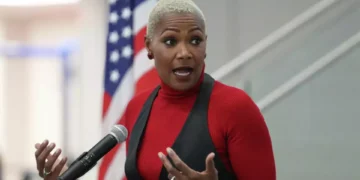Oct 17, 2024 Story by: Editor
At a forum on Ohio’s Issue 1, advocates from both sides criticized Ohio’s redistricting system. Supporters of the proposed amendment argued it would end gerrymandering by removing politicians from the redistricting process, while opponents contended it would create different challenges.
The ballot initiative, titled the Citizens Not Politicians Issue 1 proposal, aims to replace Ohio’s existing seven-member Redistricting Commission—composed of elected officials—with a 15-member citizens commission. Currently, the commission includes the governor, auditor, and secretary of state, along with four legislators, one from each party in each chamber. Under the proposal, a bipartisan panel of former judges would appoint five Republicans, five Democrats, and five independents to serve on the commission.
A “yes” vote on Issue 1 would establish the Ohio Citizens Redistricting Commission, while a “no” vote would retain the current structure.
Two forum panelists played key roles in Ohio’s redistricting conflicts in 2021 and 2022, during which Ohio’s Supreme Court—led by bipartisan support—rejected seven state and congressional district maps as gerrymandered. Former Ohio Supreme Court Justice Maureen O’Connor, a Republican, was the decisive vote against the gerrymandered maps. Ohio Auditor Keith Faber, also a Republican and co-chair of the current Redistricting Commission, was involved in the map-drawing process.
As the commission ran out of time to create constitutional maps in 2022, a federal court mandated the use of the commission’s maps for that election cycle. Justice O’Connor retired due to age limits shortly after and subsequently championed the Citizens Not Politicians proposal.
In 2023, Faber and the other commission members unanimously approved maps to be used in the November election, though Democrats noted they only agreed to the maps in anticipation of redistricting reform. They believed a “no” vote on those maps would have led Republicans to pass even more gerrymandered maps.
At the forum, O’Connor supported the Citizens Not Politicians amendment, accompanied by Kareem Crayton, vice president of NYU’s nonpartisan Brennan Center for Justice. Faber stood opposed, alongside Capital University law professor Bradley Smith. Although Faber criticized Issue 1, he also acknowledged issues with the current system.
“The current system doesn’t work very well; it was designed to compromise,” Faber remarked, though he admitted the 2023 maps still had issues. “I’m not going to tout the current map because there are some things that we could have done better,” he added. Faber argued that transitioning to the citizens’ commission might lead to litigation, noting, “nobody anticipated the (Ohio Supreme Court) injecting itself the way they did” in the current setup.
According to Faber, shifting to a 15-member independent commission could worsen the situation. “This was drafted from a ‘heads we win, tails we win twice’ political ideology,” he said.
In contrast, O’Connor saw the current system’s inefficiencies as motivation for change. “It’s time,” she told forum attendees. “You have the trigger, and the trigger was the dysfunction of the current system.”
O’Connor also addressed claims from Faber and Smith that Issue 1 could force gerrymanders favoring Democrats, “slice and dice communities,” and diminish accountability by appointing unelected commission members. Smith argued that redistricting is “an inherently political process.”
The forum also touched on Michigan’s independent commission experience, with Rebecca Szetela, a Michigan citizens commission member, warning Ohioans against repeating Michigan’s mistakes. She described her fellow commissioners as “unqualified” and lacking accountability to the public. However, O’Connor defended Ohio’s proposal, noting that it carefully studied other states’ approaches. “Yes, it is detailed, yes, it is specific, and no, it’s not Michigan,” she clarified, explaining that Ohio’s process ensures commissioners are qualified.
“We want people who vote, who are good citizens, who have the initiative and the desire to serve Ohio,” O’Connor stated, emphasizing the need for fair representation.
Kareem Crayton, Vice President of the Brennan Center, added that the citizens’ commission would “separate elections from power” and enforce anti-gerrymandering provisions. “In a functioning democracy, elections are the power,” he said. “In a gerrymandered system, power is totally immune, insulated from elections.”
Crayton highlighted that independent commissions foster more public engagement and consensus. “What you see in every independent commission state is more public engagement, more discussion about how the rules should fit together, and ultimately an outcome that generally gets broad consensus agreement in the public,” he noted. Source: Ohio Capital Journey

















